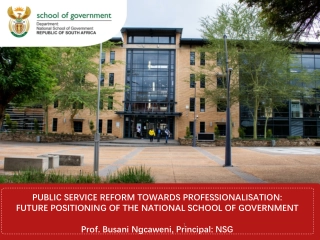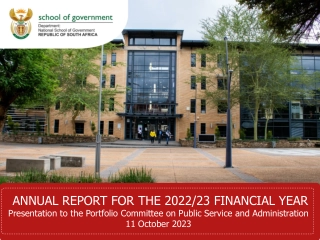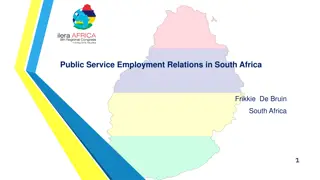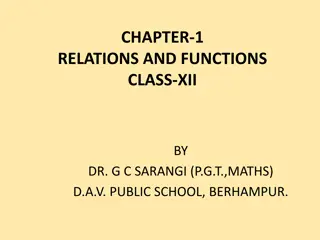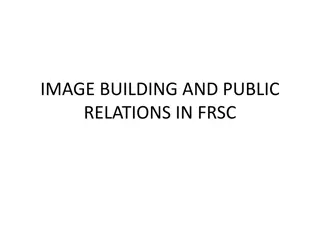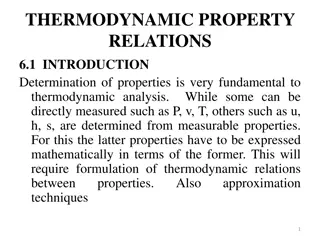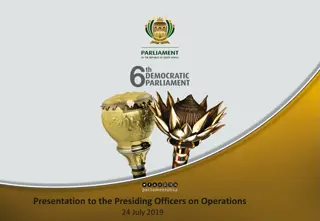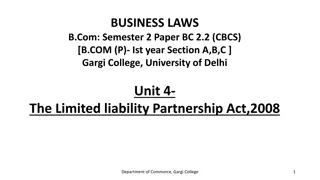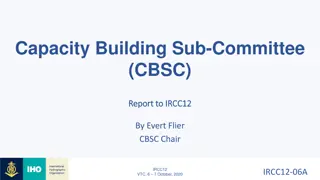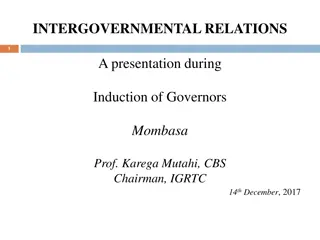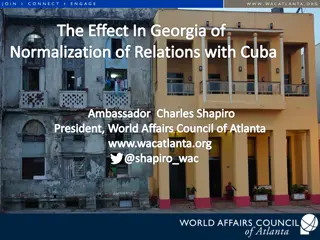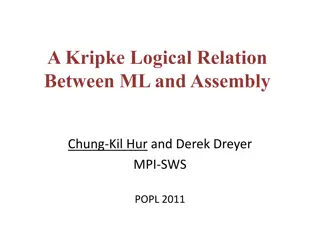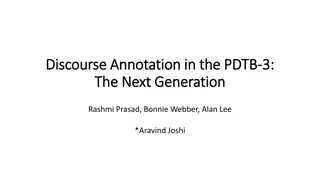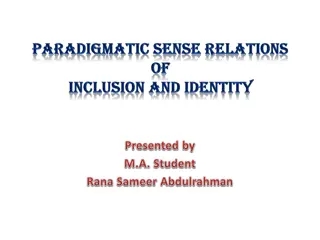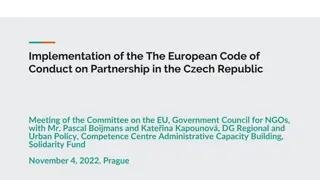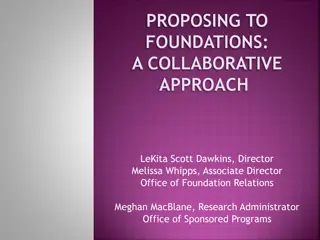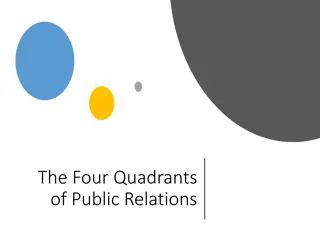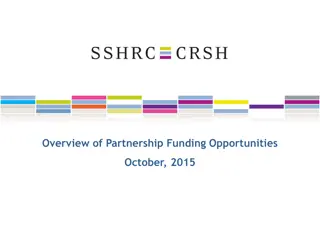Partnership Between NSG and EU for Capacity Building - SA-EU Relations Overview
The partnership between the National School of Government (NSG) and the European Union (EU) through the Public Service Training and Capacity Building Programme aims to strengthen institutional capacity for human development in South African public administration. This collaboration supports the strategic role of the NSG in continental capacity building integration, aligned with Agenda 2063. Additionally, the SA-EU Trade, Development, and Cooperation Agreement serves as a legal framework for cooperation in various areas such as trade, political dialogue, and development cooperation, fostering shared values and mutual interests between the EU and South Africa.
Download Presentation

Please find below an Image/Link to download the presentation.
The content on the website is provided AS IS for your information and personal use only. It may not be sold, licensed, or shared on other websites without obtaining consent from the author.If you encounter any issues during the download, it is possible that the publisher has removed the file from their server.
You are allowed to download the files provided on this website for personal or commercial use, subject to the condition that they are used lawfully. All files are the property of their respective owners.
The content on the website is provided AS IS for your information and personal use only. It may not be sold, licensed, or shared on other websites without obtaining consent from the author.
E N D
Presentation Transcript
Overview of the EU NSG Public Service Training and Capacity Building Programme and 19th PSTF Conference Prof. Richard M Levin Principal: National School of Government 16 October 2017 Learn Grow Serve
Introduction The National Development Plan points to building a skilled and professional public service from both the top and bottom focusing also on succession planning and developing skills and expertise at junior levels that are necessary for future public service cohorts The establishment of the National School of Government (NSG) gives expression to the imperative of creating a centre of excellence for education, training and learning to develop a public service cadre that understands and believes in the developmental agenda The launch of the partnership between the NSG and the European Union (EU) through the Public Service Training and Capacity Building Programme, seeks to support the capacity and institutional strengthening of the NSG in fulfilling its mandate This partnership also finds expression in supporting the strategic role of the NSG in relation to continental capacity building integration through the African Management Development Institutes Network (AMDIN) and in its overall support of transforming the African economy towards achieving the vision of Agenda 2063 The PSTF remains an integral body in co-ordinating the efforts of building human capability in the South African developmental public administration Learn Grow Serve 2
Public Service Training and Capacity Building Programme Learn Grow Serve 3
SA-EU Relations The SA-EU Trade, Development and Cooperation Agreement (TDCA) was signed on 11 October 1999 and was fully implemented with effect from 1 May 2004, following full ratification by all parties The Agreement was the first such framework agreement entered into by both parties, and forms the legal base for cooperation in areas of trade, political dialogue, development cooperation, economic and other areas of cooperation In 2004 both parties identified the need to further deepen cooperation in order to help address the many global and regional challenges. This led to the adoption of the SA-EU Strategic Partnership Joint Action Plan The Strategic Partnership is built on the many shared values and common interests of the EU and South Africa and serves as an instrument to jointly pursue both parties commitment to promote liberty, peace, prosperity, security and stability in the world, and in Africa in particular Learn Grow Serve 4
Public Service Training and Capacity Building Programme The EU and the NSG have concluded an agreement worth EUR 10,000,000 for a Public Service Training and Capacity Building Programme to be implemented by the NSG until June 2020 Result 1 Result 2 Result 3 Result 4 Improved systems development and HR capacity for the NSG to fulfill its training and development Strengthened research and curriculum development for increased responsiveness and relevance of training and development in meeting the needs of the public sector Improved efficacy of the public sector workplace through training and development Strengthened NSG through collaboration and strategic partnerships at domestic, regional and international levels. Learn Grow Serve 5
Public Service Training and Capacity Building Programme As we launch the Programme today, work has already commenced in the support towards the NSG, in areas such as the following: Procurement of the various programme activities have been initiated Development of eLearning materials Analysis of gaps in the NSG current business processes and re-engineering towards increased productivity, enhanced service quality, improved turn-around times and reduction of operating costs Strategic African collaborations and partnerships Learn Grow Serve 6
Transforming the African Economy Towards 2063 Learn Grow Serve 7
Agenda 2063 Advocates an active citizenry to participate in social, economic and political development and management Recognises the importance of strong public service institutions, innovation and service delivery access and improvement Emphasizes empowerment of women and youth to address poverty, social inequality and unemployment Learn Grow Serve 8
Transforming the African Economy Transforming African economies is paramount in addressing socio-economic inequalities, poverty reduction and ensuring wealth creation for the well-being of the African people. The continent is resource endowed oil and natural gas and remains home to vast cropland and reserves of minerals, which have in the main been exported without any value added industrial processing. Competitiveness also remains a major challenge to the African economy, with the 2017 Africa Competitiveness Report pointing to a list of constraints on doing business in Africa, critical among these being access to capital, corruption and inadequate infrastructure Despite visionary African leaders like Oliver Tambo, Julius Nyerere, Kwame Nkrumah, Nelson Mandela, Kenneth Kaunda, Patrice Lumumba and Samora Machel, Africa has still not fully emerged from the structural contradictions of underdevelopment, inequality and poverty To some extent this is attributable to an inability of subsequent leaders to fill the shoes of these African giants and pave the way for African growth and development. The developed world and global institutions are equally culpable for reproducing Africa s post-colonial challenges. Through the Washington Consensus, the IMF and World Bank have exerted pressure on Africa to deregulate the market, when it is and has been controlled by Multinational Corporations (MNCs) for over a century Learn Grow Serve 9
Transforming the African Economy In 2015 a report on illicit capital flows by the AU/ECA high-level panel chaired by former South African President Thabo Mbeki showed how between 2001 and 2010, an annual average of $50 billion flowed out of the continent illicitly. This would equate with $1 trillion over the past 50 years, equal to all the development assistance received by Africa and enough to wipe out the region's total external debt of $250 billion and leave $600 billion for poverty alleviation and economic growth The illicit flows have grown over time; the trend between 2002 and 2011 is put at 20.2 per cent. The role of MNCs is pivotal through trade mis-invoicing, abusive transfer pricing and base erosion and profit shifting to subsidiaries in low-tax or secrecy jurisdictions The corruption of the MNCs has also sponsored corporate capture of the state and prevented African states from establishing people's democracies to transform the historical plight of its oppressed and exploited people and communities Africa needs the rest of the world to stop looting its wealth and resources and to cease being a net creditor for development in Western Europe and North America Report of the High Level Panel (2015: 64). Learn Grow Serve 10
Transforming the African Economy Since the Paris Declaration of 2005, we talk of partners not donors. The question we need to ask ourselves in the context of he NSG-European Union Public Service Training and Capacity Development Programme is: have the practices and actions governing the partnership changed in line with the Paris Declaration? Dambisa Moyo s book, Dead Aid , outlines how official development assistance (ODA) plays a significant role, in increasing African dependence on the West. The African Union Commission s Mbeki Panel Report on Illicit Flows also demonstrates that ODA is amounts to less than illicit flows. For the NSG and the EU, to be partners and not have a donor-recipient relationship, we must have a relationship built on trust. Programme content certainly meets the partnership ideal. But the NSG s administrative and financial processes must also be trusted by the EU for us to transform the African Political Economy landscape. Learn Grow Serve 11
South African Development Public Administration Learn Grow Serve 12
South African Developmental Public Administration Our historical legacy of apartheid and colonialism requires our democracy to liberate Blacks in general and Africans in particular from political and socio-economic bondage. More specifically, this entails the resolution of three interrelated contradictions arising out of colonialism and apartheid; racial oppression, class super-exploitation, and patriarchal relations of power Our political system is founded on the democratic principles of the Freedom Charter and enshrined in our Constitution. The Constitution requires Public Administration to meet people s needs; be development oriented; and be participatory As in South Africa, across the globe, millions remain marginalized, impoverished and economically excluded. Participatory people-centred development is seen as legitimate globally and provides spaces for alternative paradigms of development to the dominant neo-liberal model The state in its relationship with society must construct hegemony through mobilising South Africans around a common vision. The state needs to embed itself in a manner that enables state and society to interface dynamically and harness the innovative and transformative energies of South Africans across all sectors Learn Grow Serve 13
South African Developmental Public Administration We must acknowledge and appreciate what we are doing correctly: Strength and resilience of our democratic institutions Overarching National Vision, Planning, Monitoring and Evaluation system Strong Public Finance Institutions Despite declining economic growth and employment, continuous improvement in the quality of services and standards of living for all South Africans South Africans are better off, better educated and better housed HOWEVER Economic freedom remains elusive Learn Grow Serve 14
South African Developmental Public Administration The year 2017 has been declared to be the Year of Oliver Reginald Tambo, in honour of a visionary leader and patriot who would have turned 100 years old this year In his address to the United Nations Economic Commission for Africa (ECA) in April 1979, Tambo shared the vision of a future in which we shall no longer experience the haunting spectacle of a child rummaging through refuse heaps, searching for rotten morsels of food and when we shall no longer experience the terrible destitution of our peoples that is the heritage of colonial and imperialist domination and the continuing unequal relations between the powerful economic centres of the Western world and our continent . Learn Grow Serve 15
Building Human Capability in the Public Sector Learn Grow Serve 16
Building Human Capability Public Sector Management Reforms in Africa (Economic Commission for Africa Report ) Public service has always been the tool available to African governments for the implementation of developmental goals and objectives but many African countries have not come close to their goal of developing and transforming their societies to the same standards as developed countries Most African countries established MDIs at independence but standards of capacity building have been compromised due to exclusion from the centre of government administration to the periphery; no consultation about government policy decisions; relegation to a lower status and inadequate funding OECD Report on National Schools of Government Building Civil Service Capacity, May 2017 Schools of government are uniquely placed to enhance the capacity of public servants to meet the leadership, policy and delivery challenges they face Can play this role both directly, through their learning and training programmes, and indirectly, by encouraging a learning culture that contributes to civil service effectiveness and efficiency Learn Grow Serve 17
Building Human Capability The African Management Development Institutes Network (AMDIN) is a continental public sector capacity building network that has the potential to play an important role in supporting the economic transformation agenda on the continent In December 2016, the Commission of the African Union (AUC) signed a memorandum of understanding with AMDIN in order to, inter alia, develop African leadership and management capacity for the needs of the African people and their governments; exchange knowledge towards common perspectives on public sector management in Africa; and advance the development of the continent by promoting research and training to improve public services in Africa In this way, AMDIN provides member states in Africa with the opportunity to ensure that the continent will be better placed to cope with rapid socio-economic changes at a global level and the impact of the Fourth Industrial Revolution The NSG currently serves as the Secretary-General of AMDIN Learn Grow Serve 18
Building Human Capability The NSG is emerging as a centre for innovation, thought leadership and elearning. This learning modality is being enhanced through the introduction of open online courses, which truly open the doors of learning and culture to all state employees and include offerings on Managing Performance and Professional Ethics With regard to the latter, the School has entered into a memorandum of agreement with the Financial Services Board (FSB) to offer ethics training to all of its staff. We are engaging with numerous organs of state to offer our programmes. An exciting pilot programme is an open online course on financial delegations for public service managers. The value of open online learning is that it is self-paced and provides participants with the opportunity to learn when convenient for them The School is strengthening its training facilitation capacity through the Rutanang Ma Afrika campaign, by inviting retired and current public servants to utilise their knowledge, expertise and experience to empower fellow public servants This is a call for such public servants to contact the School to be a part of a campaign towards improving workplace learning. We have an interesting programme Lead Facilitators Development Programme which trains potential training facilitators in the art of facilitation Learn Grow Serve 19
PSTF Conference This gathering of HRD practitioners within the public sector is integral to building capacity for the South African developmental state This Forum seeks to ensure that there is professionalisation and growth among the practitioners, and that a platform is created for discussions, the sharing of ideas, exchange of knowledge and the fostering of partnerships to improve HRD practices in the public sector In order to achieve Vision 2030, the public sector must have a strong cadre of public sector trainers and facilitators who are themselves well capacitated to be able to empower other public servants with requisite skills, competences and attributes Under the theme Enabling Vision 2030 through HRD , you need to engage on key issues : Public sector policy implementation of talent and career management systems Knowledge management systems and strategies supporting HRD practice for the fourth Industrial Revolution (4IR) HRD in the declining economy: value for money: Implications for practitioners and organisations Revitalising the role of the State to produce technical skills and specialist professionals Building public sector learning organisations Learn Grow Serve 20
I wish you well in your deliberations Ngiyabonga Kealeboga Thank you Dankie Learn Grow Serve 21


